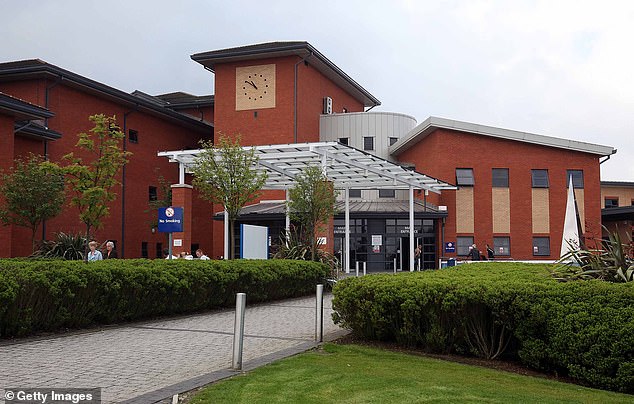Father-to-be, 40, died from a sudden cardiac death hours before his daughter was due to be born after doctors missed test results that could have saved him
An expectant father died of sudden cardiac death just hours before the birth of his first child after doctors missed an abnormality on emergency room scans.
Thomas Gibson, 40, was found unconscious at his Manchester home by partner Rebecca Moss, who was 39 weeks pregnant with their daughter Harper at the time.
Mrs Moss, who was due to have a scheduled caesarean section the same morning, called 999 before performing CPR but was unable to save him. Harper was born safely hours later, but Mr. Gibson never met his first and only child.
Manchester University NHS Foundation Trust has since admitted to Ms Moss that it provided negligent medical care to Mr Gibson, which caused his sudden cardiac death.
The trust told the family he should have been admitted to cardiology as an inpatient and fitted with a pacemaker, which would likely have prevented his death.
Rebecca Moss was 39 weeks pregnant with their baby at the time of Thomas Gibson’s death

Thomas Gibson and partner Rebecca Moss, who gave birth to their child hours after his death

Thomas Gibson, who suffered sudden cardiac death last year, and his partner Rebecca Moss
Three weeks before Mr Gibson died, he came down with a stomach flu from which he had difficulty recovering.
After not being seen in person by his GP – Delamere Medical Center in Stretford – he contacted 111 and was told to go to Wythenshawe A&E due to his symptoms.
While in A&E, Mr Gibson was given an electrocardiogram (ECG) test which showed abnormal results – identifying complete heart block.
Also known as third-degree heart block – the most serious type of heart block – it can lead to sudden cardiac death, which is what happened in Mr Gibson’s case.
The abnormality on the ECG was missed by the emergency room doctors and he was discharged by the GP for follow-up care due to his stomach flu.
Then, on the morning of June 7 last year, pregnant Mrs Moss found him unconscious at their home and was unable to save him.
Now an inquest will take place at Stockport Coroner’s Court from June 4 to 5 – almost exactly a year after his death.
Ms Moss hopes to have a series of questions answered at the inquest, including how Mr Gibson had two ECGs during his admission and what led to them both being misinterpreted.
She also questions whether there is too much reliance on an automatic ECG report being produced, which in this case was incorrect.
Ms Moss would also like to know whether A&E doctors had sufficient training in interpreting ECGs and, if they had not, whether they realized they needed more senior or specialist input.
It is understood Mr Gibson was not assessed by a specialist cardiologist during his admission.

An inquest will take place at Stockport Coroner’s Court into the death of Thomas Gibson

Thomas Gibson had third-degree heart block, the most serious type of heart block
The clerk who dismissed Mr Gibson is said to have felt that there were no cardiovascular symptoms because he attended with gastrointestinal symptoms.
However, Ms Moss disputes that there had in fact been several cardiovascular problems during his admission and is therefore concerned about a problem with communications within the trust.
She would also like to ask whether there is complacency on the part of the registrar and generally in dealing with younger patients and ‘an inability to view the patient as a whole and consider the full clinical picture’.
The family’s lawyer, Charlotte Moore, of CL Medilaw, said: ‘Tom’s tragic death resulted from a misinterpretation of a basic cardiac function test, for which we have received a full admission of liability for Tom’s partner, Rebecca.
‘If the ECG had been interpreted correctly and showed complete heart block, Tom would have been fitted with a pacemaker and his untimely death would have been prevented.

Thomas Gibson died just hours before his partner gave birth to their daughter

Thomas Gibson was told to go to Wythenshawe Hospital in Manchester due to his symptoms
“For this to happen on the day Harper was born adds to the pain and anger Rebecca is now experiencing as she loses Tom unnecessarily.
“Harper’s birthday, which should have been a joyous occasion, will be forever tinged with grief for Rebecca and Harper over the loss of their loving partner and father.”
The charity Cardiac Risk in the Young (CRY) says that 12 apparently fit and healthy young people aged 35 and under die every week in Britain from undiagnosed heart conditions.
Dr. Steven Cox, director of the charity, said: ‘In 80 per cent of these cases there will have been no signs or symptoms of a heart defect until it is too late. That’s why CRY believes screening is so crucial – especially for those involved in regular, physical activity).
‘That is why CRY now tests around 27,000 young people every year, between the ages of 14 and 35.’
Manchester University NHS Foundation Trust declined to provide a statement to MailOnline ahead of the inquest taking place next week.
